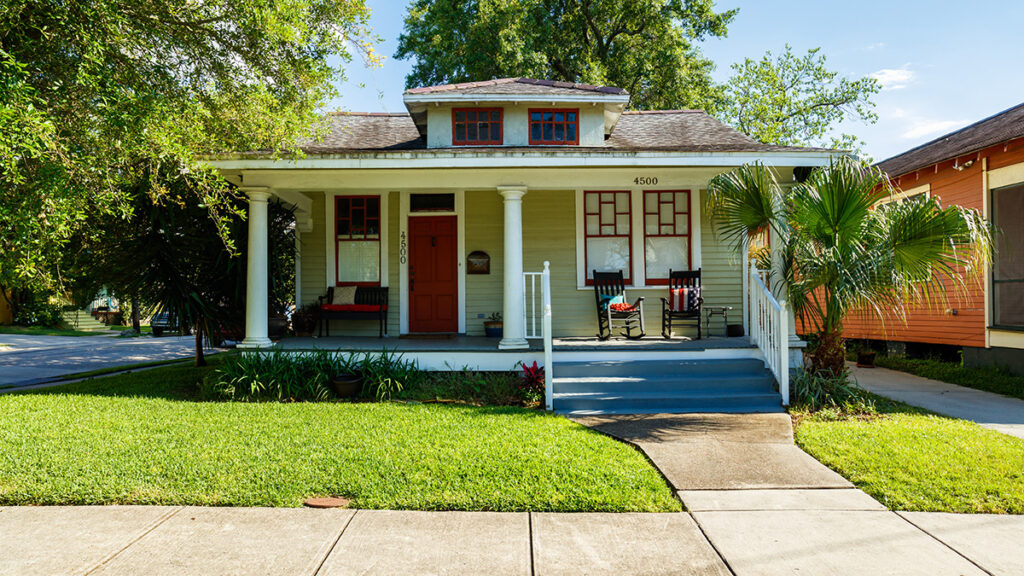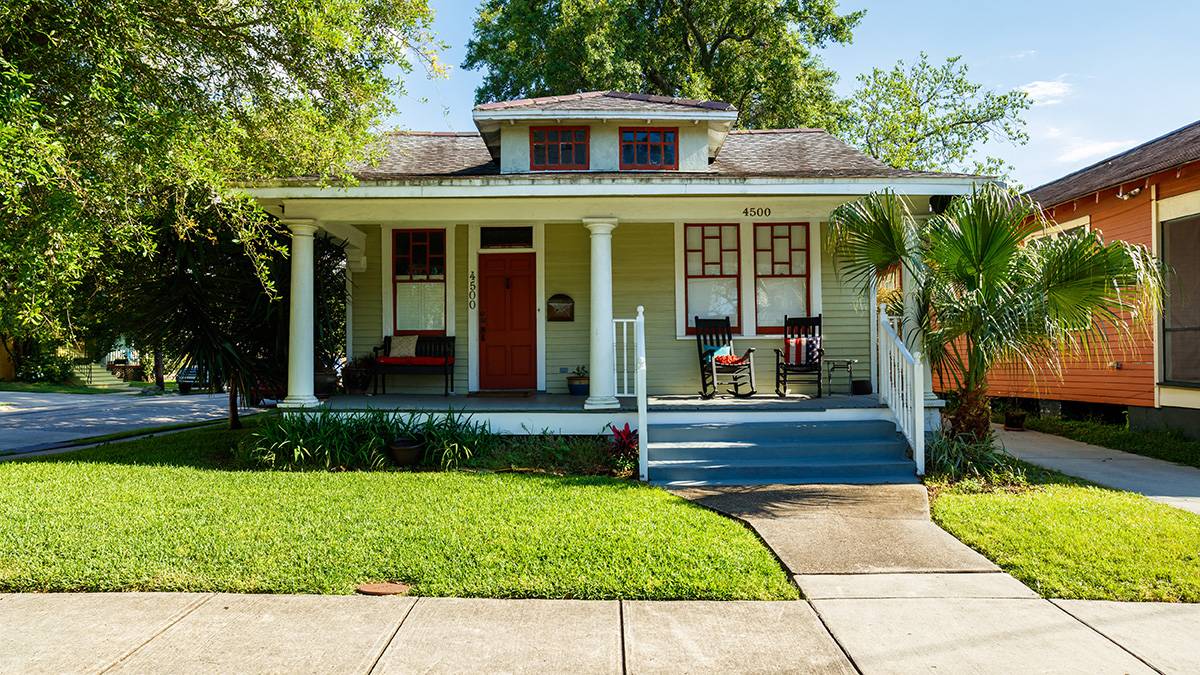Getting a mortgage to buy a home requires a good credit history, but it doesn’t have to be 100% perfect. Perhaps even more important is how much debt you have in relation to your income.
You’ve found it. Your dream home, complete with the white picket fence and window boxes, or the home theater and infinity pool. You march into your local bank and proudly declare, “I’d like a mortgage, sir!” He smiles and nods and bestows upon you the keys to your brand new house.
This is, of course, an appropriate timeline for buying a dream home in your dreams, but it’s far from reality. Lenders don’t just hand out wads of cash for any and every prospective home buyer; they hand out stacks of paperwork. There’s a lot to know about getting your first mortgage, but the one thing you already DO know is that your credit history is going to play a major part. As a matter of fact, that little number has the power to make or break your chances of becoming a homeowner.

What credit score do you need to buy a house?
Most home loans require a credit score of 620 or higher, but not all of them. In fact, you can get an FHA loan with a credit score as low as 500 and a 10% down payment or a minimum 580 credit score and a 3.5% down payment. That may not be the best idea, however.
Since credit score indicates a borrower’s risk (or lack of), lenders are going to distribute their higher rates to borrowers with lower scores. With this in mind, although you can purchase a home with a credit score of, let’s say 540, borrowers with a higher score, such as 740, are the ones who will walk away with the best offers.
When lenders work with buyers who have low credit scores they find ways to mitigate that risk. For instance, you’ll likely pay a higher rate and perhaps even a larger down payment. In other words, they need to cover their butts in case you can’t pay, which, based on your low credit score, is a real possibility.
How can you build credit in preparation for buying a house?
Whether you’re only beginning to build credit or are attempting to build your credit back, there are multiple ways to increase your credit score and, as a result, your chances at buying your dream home.
Apply for a credit card
One of the best ways to build credit is by getting one or more credit cards and using them responsibly.
Credit cards aren’t inherently a debt trap. As long as you use them to pay for things you regularly buy and repay the balance in full at the end of every month, you won’t incur interest charges.
If you already have a credit score in the 600 range, you can likely get approved for a number of cards that can help you build credit. See the best credit cards for people with 600-650 credit scores or 650-700 credit scores.
If you do not have any credit history yet, your best bet is going to be a secured credit card. Secured credit cards require a security deposit of a few hundred dollars. Because of this, nearly anybody can get approved for one. As you use a secured card, it will help you build credit just as any credit card does.
Keep credit inquiries to a minimum
While the number of credit cards you have is less important than how you use them, applying to a bunch of cards all at once won’t help your credit score either.
When you submit an application for a credit card, it’s represented as a hard inquiry on your credit report and typically subtracts five (or more) points from your score. Consequently, if you’re applying to several credit cards all at once, it could have a significant impact on your score and may signal to a lender that you are high-risk.
Instead of applying to several credit cards to see which ones you qualify for, do some research in advance and take advantage of pre-qualification forms online (soft inquiries).
Pay bills on time
This tip is a no-brainer, especially considering the fact that “payment history” is the largest factor (35%) affecting your overall credit score!
While applying to multiple credit cards at once has the potential to trim a few points off your score at a time, making payments late can slice off 100 points or more! (Late payments are reported to credit bureaus if they are 30 or more days past due). Meanwhile, making payments on time will have the opposite effect, gradually increasing your score over time.
Keep balances low and cards open
Another way to build your credit is by keeping your balances low. Experts suggest you avoid using more than 30% of your available credit, referred to as your credit utilization ratio. For example, if your credit limit is $1,000, it’s recommended that you spend no more than $300. In fact, you should probably spend much less than that, if you’re able, and if you’re carrying debt, pay that down ASAP!
Additionally, even if you stop spending money on your credit card altogether, you should keep it open, especially if it’s an older card. The reason for this tip is that your older cards mark the beginning of your credit history, and lenders want to see an established credit profile. Also, closing a card will reduce the amount of credit you have available and, as a result, may bump your credit utilization ratio up above 30%.
Review your credit report for errors
Finally, it’s important to check your credit report and scores every so often for errors.
Every year, you’re allowed one free copy of your credit report from each of the major credit bureaus — Experian, Equifax, and TransUnion. Take advantage of this offer and make sure those records are tracking your credit history accurately. If you find something that’s incorrect, like a record of a missed payment that you actually made, contact the bureau to right the wrong.
Scanning these reports for errors could result in an immediate bump in your credit score!
Pay off delinquent accounts
While checking your credit report for errors you may find some old accounts that you haven’t been paying. Maybe you forgot about them — or maybe you didn’t — but either way, getting these delinquent accounts paid off can go a long way toward raising your credit score.
The newer models of credit (FICO 9) ignore accounts that have been in collections but have zero-dollar balances. But even if your lender is using the older model (FICO 8) paid off balances look better than outstanding delinquent accounts.
Use your bill payments to build credit
Did you know you can actually get credit for paying your bills on time? Typically, paying your bills, such as rent, electric bill, Netflix, cell phone, etc, won’t do anything to build your credit score but Experian has a free service that solves that.
To use Experian Boost you simply sign up, link the bank accounts you pay your bills from, and let Experian know which bills you want it to track.
Once you are signed up, paying those bills on time will begin to improve your credit.
What other factors do lenders consider to determine your borrowing eligibility?
Your credit history is crucial when it comes to home-buying potential, but mortgage lenders evaluate a lot more to determine whether or not you’ll be a reliable borrower.
Here is a short list of the most common financial factors lenders consider (the specific qualifications required for each of the following categories depends on the type of loan):
- Income: lenders want to see that you’re making enough money to afford your monthly mortgage payments.
- Employment history: lenders typically look for steady income, often in the same job/industry over the last two years.
- Tax returns: generally for the last two years.
- Debt-to-income ratio: this measures how much of your income is used to pay off debt; lenders typically want your total monthly debts to be no greater than 43% of your gross monthly income. Arguably, your DTI is even more important than your credit score in determining your eligibility for a home loan.
- Savings balance: lenders typically look for enough savings to cover two months’ worth of mortgage payments.
Can I still get a loan if I don’t meet the credit profile qualifications?
While it is possible to qualify for a mortgage loan with bad credit, you’ll need something else to win lenders over…like cash. Lenders want to know you can afford to take on such a significant financial burden, and if you come to the table ready to put down a hefty down payment, you’ll have their attention.
For example, if you want an FHA loan through Rocket Mortgage by Quicken Loans, you would need a credit score of 580 or higher and a minimum of a 3.5% down payment. However, if you’re able to afford a 10% down payment, you could qualify with a credit score of just 500! Or, if you have poor credit but also have a healthy debt-to-income ratio, you could qualify for some government-backed loans through Rocket Mortgage.
Keep in mind lenders are evaluating much more than your credit history, and every lender will weigh categories differently.
Summary
A good credit score can take years to establish, so it’s important to start building up your credit long before your dream home presents itself.
While there are some government-backed loans, like FHA and VA loans, available for borrowers with poor credit, they come with some cons as well, like high-interest payments.
So, start building credit as soon as you can!
